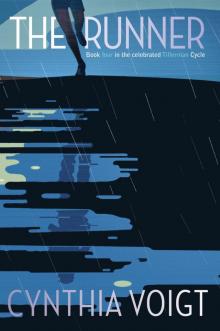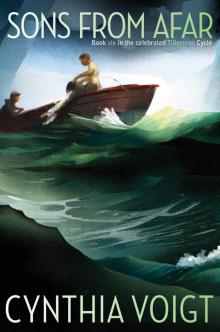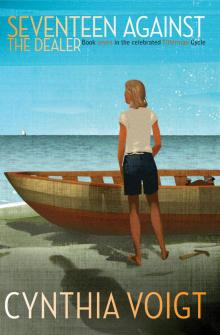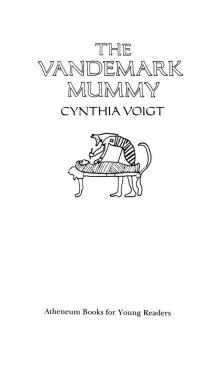- Home
- Cynthia Voigt
The Book of Kings Page 10
The Book of Kings Read online
Page 10
Max stumbled back into character and into the reception area, where the rest of his companions were waiting for the desk clerk to give them their room keys. It was Alexander Ireton who came quietly up to his employer to say, “I think something has happened, sir. In Andesia. I overheard a conversation which I only partly understood…” But he couldn’t go on and he glanced desperately at his grandmother.
“Oh, M—” she started to say, before his quick head shake stopped her. “M—my goodness.”
Mr. Bendiff took charge. He sent Colly to find a newspaper. “In our own language, if possible.” But Colly could bring them only a Spanish edition, which Grammie translated, in the privacy of the suite Ari had been given.
As soon as the door closed behind them, Max asked, “Did the palace cook shoot them?”
“Give me a chance to find the article,” she snapped. When she had, on the back page where news from unimportant places is reported, her translation was not smooth, or complete—“…a word I don’t know,” she often interrupted herself to say—but the bare facts were clear. There had been an explosion in the palace kitchen in Apapa; a serving woman had been killed and the cook wounded; the scullery maid escaped harm because she had just been sent out to dump a bucket of vegetable peelings into the pigs’ trough. “Is chancho pig, do you think? Is any other domestic animal fed vegetable scraps? Do they have pigs in Andesia? I don’t know enough!” The article reported that a large confection had appeared in the kitchen that morning, set out on a silver tray. Nobody knew where it had come from, but it was clearly intended for the royal table. A bomb had been hidden within the many layers of a cake that had been frosted with chocolate and decorated around the edges with wildflowers. The cook had had no reason to question its presence, or so she said. The great houses often sent gifts of food to the King and Queen. This cake was larger and more elaborate than most, the cook allowed, but why should that make her suspicious?
“They must have mis-timed the explosion,” Mr. Bendiff said.
“Who are they?” Max asked miserably.
“There’s something else here,” Grammie said.
At the end of the article, the writer mentioned an incident that had taken place a few months earlier, a shot that had been fired as the newly crowned royal couple was coming out of the Caracas cathedral—“That’s the photograph we saw,” Grammie reminded Max, who didn’t need reminding. He went to the window and looked down onto a busy street where ordinary carriages filled with ordinary people wandered up and down, and women carried parasols against the strong sun.
“The police blamed anarchists for the shot. They never caught anybody.”
“What would an anarchist be doing trying to kill the King of Andesia when he’s in Venezuela and they don’t even know what kind of a King he’ll be yet?” Max protested.
“Anarchists believe that if they can assassinate one member of a royal family, the political structures of the country will fall, one after the other, like a row of dominoes,” Ari explained apologetically. “And they’re right about places like the Balkans where there are always small wars going on. Remember, Colombia has just recently come out of a civil war, and Balcor’s army just put down an uprising in Andesia, and Venezuela may look like a single country but it’s divided up into areas of influence, and they’re like small nations under the rule of military strongmen who are always ready to fight.”
“The newspaper says the exploding cake happened almost two weeks ago. The reporter got the story from one of the soldiers in the occupying army. One of Balcor’s soldiers,” Grammie concluded.
“Is this Balcor one of those military strongmen?” Mr. Bendiff asked.
“Was Balcor behind the bomb?” Colly wondered.
“We don’t know anything, do we?” Joachim observed.
It was Tomi who said what they were all thinking. “We’d better get there as fast as we can.”
—
Ari and Mr. Bendiff arranged at the hotel for telegrams to be sent announcing their safe arrival: one to Gabrielle, who would take word to the Baroness, and one to Mrs. Bendiff, who would inform Pia, who would, in turn, arrange for Tomi’s parents and Colly’s grandparents to be informed. Grammie, with Joachim, went back to the dock to locate a boat to take them along the coast to Maracaibo, the clerk at the hotel having assured them this was the fastest way to get there. From Maracaibo they’d go to Cúcuta, Colombia, and if they could be in Cúcuta Tuesday morning, he told them, they could travel on to Apapa with the regular wagon train. “It will be safest,” he told them in his simplest Spanish. “Always, there will be soldiers, for the silver and copper, and also they protect the strongbox holding the gold coins for which the ores are sold. No bandits dare attack Stefano’s wagons.”
Grammie didn’t care about discomfort or danger. “We’ll have to leave tomorrow to make the connection. It doesn’t look like a storm, does it? We’d better pick out what we’re carrying with us, and leave those language books behind.”
Ari went to the bank with his letter of credit from King Teodor and procured a supply of the local currency—for travel expenses, for living expenses in Andesia, however long they would be there, and for bribes, if they were needed.
“I don’t believe in bribing,” Mr. Bendiff announced over dinner.
“Neither do I, but it’s what the Andesians believe in and what Balcor believes in that concern us,” Ari said, adding, “Teodor had a message waiting for me. He’s had a response from Andesia. They’re expecting us and have expressed their eagerness for our arrival.”
“Whoever they are. Whatever that means,” Joachim remarked gloomily, and nobody corrected him.
The arrival
They spent two days and one long, wet night on the open deck of the packet that took them along the coast and into Lake Maracaibo, where small square houses standing on stilts out in the water became the first entry in Joachim’s expedition sketchbook. Then came two long days and longer nights jouncing in a coach to Cúcuta, and Joachim could not have made sketches even if he hadn’t been too disgruntled by the discomforts to be interested in what he was seeing. After a night in a rough country inn, where the entire party slept on cots set out in one room, they joined the wagon train on its regular biweekly run between Cúcuta and Apapa. There followed four days of walking a well-traveled wagon track from damp dawns until gray evenings, with only a brief midday rest, moving at the pace of mules on rough, ascending roadways. After the first morning, Joachim insisted that he and Grammie ride on the tailgate of the wagon that was carrying their luggage.
A company of soldiers marching at the front and rear accompanied the wagons, but the wagon train boss was a loud, stocky civilian named Stefano, who spent much of the journey cursing at the muleteers and porters when anything went wrong. The soldiers and the Andesians all wore loose trousers, rough shirts, and heavy boots, but the soldiers carried rifles on their backs and their chests were crossed with bands of ammunition, while the Andesians, even Stefano, wore woven ponchos against the rain and wide-brimmed chupallas against the sun.
The soldiers didn’t mix with the Andesians or the strangers, the Andesians didn’t mix with the soldiers or the strangers, so the rescue party learned little during the long trek except more than they cared to know about the insect and animal life of the landscapes through which they moved, the lowland tropical forests and the barren uplands. They all slept with their boots on.
They had not understood how close they were to their destination and nobody had warned them that this was the day of arrival, so when the wagon train rounded a long curve of ridge and the valley opened out before them as abruptly as if they were emerging from a long tunnel, every member of the rescue party inhaled sharply, though whether for the unexpectedness of the scene or its beauty none of them could have said. Suddenly a valley lay before them, surrounded by jagged mountains, their crests still white with snow. The lower slopes of the mountains were bright with white and yellow flowers, and occasional one-room earth-colored h
ouses were scattered on the foothills, where movement could be seen, some of it human, some animal. The strong midday sun washed over the whole narrow valley, at the heart of which a small city had grown up on both sides of a fast-flowing mountain river.
Max stared down at the city where his parents had been held for almost five months. His heart beat fast and he did not dare look at his grandmother.
Ari sent word to Stefano that they needed to make a brief stop. When Tomi and Colly had pulled down the suitcases, they washed up as best they could in buckets of water, all the while looking ahead and around, at the hills that rose up from the valley and the endless range of mountains that surrounded it, and the three mountains that loomed close over its western side. These three had scrub forests at their skirts, marked in three places with blotches of bare ground, like mange on a dog.
Joachim and Grammie stretched stiff muscles and rinsed off dusty faces and hands, but didn’t bother to change their clothing. “I’ll be wearing men’s trousers for the return,” Grammie muttered to Joachim. “You can be sure of that.”
“Maybe they’ll hang us and you won’t have to,” Joachim suggested.
Grammie laughed.
“You’re always laughing at me,” Joachim grumbled.
“It’s either that or take you seriously, and I have no desire to spend my days being a gloomy Gus,” she told him.
He didn’t argue. Instead, he pointed out, “Do you know how long it’s been since I held even a pencil in my hand?”
“About as long as it’s been since I had a hot bath,” she told him.
Ari interrupted. “It won’t be much longer now. I just wish I could understand more of what they’re saying. I didn’t realize how hard it is to learn a language.”
Max buttoned his shirt and studied the city. He put on his jacket and slipped his feet into dress boots without looking. On the side of the river beneath the three peaks, the small houses crowded around an open space so perfectly square it had to be a plaza. There was one long, low, brown-roofed building among the houses, and he couldn’t see any real streets, just twisting alleys. A single bridge crossed the river. On the western shore, the buildings were fewer and larger, three with gardens behind high walls, one a big stone building with a short square tower at its side, and, built at a distance from the others, a long, whitewashed one-story building next to a wide dirt rectangle, the edges as clear as if it had been cut out of the grass with a sword’s blade.
“Do you think the one with the tower is the royal palace?” Max asked Ari.
“Where’s your hat, Alexander?” Ari answered, reminding Max of who he was supposed to be. “This occasion requires hats.”
Max dusted off the detested bowler and decided, “The white building is probably the barracks. How many soldiers are stationed in Andesia?” he asked.
Ari settled a plumed tricorn on his red hair and answered, “We’ll find out. Enough to protect us, I’m sure.”
Not too many to fight our way out through, Max hoped.
Going slowly, the wagon train followed the road down steep hillsides scattered with low adobe houses, some set among terraces that were plowed and ready for planting, others standing solitary in grassy pastures where wildflowers grew thick. They passed herds of woolly-coated animals that grazed close to some of those houses, but they saw no one. No one came out even as far as a doorway to greet their caravan, with its soldiers marching smartly at its front and rear, or even to stare curiously at the foreigners.
From closer up, the three mangy blotches on the mountainsides could be identified. “Must be the mines,” Mr. Bendiff said. “See those railroad tracks leading into the mountains?”
Ari pointed out three narrow dirt roads winding down to meet theirs not far ahead. “They must bring the ore down in carts, to be stored.” When he looked, Max could identify a low building surrounded by soldiers at the point where the three tracks intersected with the roadway.
In fact, the caravan stopped there, leaving two of the wagons, their empty beds covered tightly by tarpaulins, and all of the soldiers, who took with them a small locked chest. Stefano’s own two covered wagons were the only ones to make the final slow descent, through darkening air, into the city.
Night fell fast and hard in this high valley. By the time Stefano’s goods had been unloaded and the foreigners’ suitcases piled into a handcart, his single lantern was the only light left to guide the party along winding dirt alleys lined with small houses to a stone bridge, its railings no higher than a man’s knees. The only sounds were their footsteps and the creak of cart wheels and the rush of water. The entire city lay in dark silence.
The members of the embassy were too busy being sure of their footing to find anything to say to one another during these final steps of the journey, and too tired, and especially too eager to, at last, arrive. When they came up to a building, they sensed rather than saw the dense shape. Behind them, the three jagged peaks were silhouettes that blocked most of the star-studded sky.
Stefano unloaded the luggage and walked off without a word of farewell, pushing the cart ahead of him. As his footsteps faded away, the embassy banded closer together, facing a mass that seemed to loom in front of them, and above them. Nobody had anything to say. The surrounding silence grew deeper as the darkness thickened.
Then a door was thrown open and a tall, silhouetted figure stood in the blinding burst of light.
Nobody moved. Nobody spoke.
The light from the doorway also showed them two armed soldiers stationed in the shadows at each side of the entry. The silhouette called, “Come! Come forward! Envoy of the King Teodor, welcome!”
They looked quickly at one another, like actors about to step onto the stage and begin the play, and Ari moved into the light, resplendent in a red military jacket, a short line of medals at his breast, gold epaulettes on his shoulders, gold trim at the sleeves and hem of the jacket as well as gold stripes down the sides of his black trousers. He carried his plumed hat under his arm. A sword hung at his side and he did not smile or extend his hand. Instead, he clicked the heels of his shining boots smartly together. “Andrew Robert Von Bauer Cozart, heir of the Barons Barthold,” he announced stiffly, and bowed. “To whom do I present myself?”
The man was taller than Ari and attired with equal formality in a black suit that fitted him close around the chest, with silver buttons down the front of the short jacket and silver trim at the military collar, the sleeves, and the flared hem of the trousers. His sword’s scabbard gleamed silver. He was a long-nosed man, with no spare flesh on him and a restless cleverness on his face. “I am Juan Carlos Carrera y Carrera,” he announced. His dark hair shone and his thick, dark mustache glistened. “I am your welcome here, into the royal guesthouse. You must enter. It will be warm, there is food.” He stood back and swept an arm, to usher Ari in.
Max had a sudden melodramatic impulse to shout at Ari, Don’t do it!
Ari stepped into the house but stopped just inside the entry to wave Mr. Bendiff forward and introduce him. “A man adept in the field of business, whom King Teodor has named to this embassy.”
Mr. Bendiff, his homburg in his left hand and a wide smile on his face, reached out his right hand to shake the Andesian’s. “Señor, it is a pleasure.”
“Señor,” echoed Juan Carlos Carrera y Carrera, with a smile and a bow, “delighted, welcome, enter, enter.”
Oily. Max could almost hear his father’s voice pronouncing the words, An oily feller, that’un.
“My Secretary,” Ari announced.
A properly suited Alexander Ireton received a brief nod of the head and a slight gesture of the hand from the Andesian as he stepped eagerly into the light, to see…
He didn’t expect to see his parents waiting. Not really. He did know better. But still, he looked all around, down to the staircase at the back of the entryway and into the two rooms he could see, one to his right, one to his left. Behind him, Ari called in Joachim, Grammie, then Colly as Mr. Bendiff
’s valet, and finally Tomi Brandt, who was the party’s general dogsbody. “Dogsbody?” the Andesian asked. “This is a word I haven’t heard.”
Max paid no attention. He was looking into the house.
The two rooms he could see from the entry were lit by oil lamps and chandeliers, and both were empty of people. One was a long sitting room, furnished with a sofa and chairs, desk and bookcase, where nobody waited. The other seemed to be a small dining room, where a round table offered loaves of bread and thick wedges of cheese, as well as a roast of some kind, ready to be sliced. Tall silver goblets and long-necked silver ewers were also set out, and no royal couple stood at the table, ready to laugh at the surprised look on their son’s face.
Grammie had her own part to play, so “I’d like to see the kitchen,” she announced, not exactly speaking to the Andesian but clearly not addressing her remark to Ari.
Juan Carlos Carrera y Carrera clapped his hands, once, twice, three times. Immediately, as if he had summoned them like genies from a bottle, two short, olive-skinned women stepped into the shadows at the back of the hallway. Their long cotton skirts were made from red and brown strips of some woven material and their dark hair was braided into thick plaits. They did not look at the strangers, but only at the Andesian, who spoke to them in quick Spanish, of which Max understood the words Señora Cocinera, Mrs. Cook, and also he thought he had recognized the word vigilar. The two women turned to Grammie, and curtseyed, and nodded, then waited to be given their next order.
“Devera and Suela,” Juan Carlos named them, without saying which was who. “They will not know your language,” he told Grammie, as if he was happy to disappoint her. “And how should they? The Carrera y Carreras had governesses, but these people cannot even read their own native tongue. And what use would it be to them if they could? They do their work, they are docile. You will find them good servants, Señora.” He smiled.

 The Runner
The Runner By Any Name
By Any Name Bad Girls, Bad Girls, Whatcha Gonna Do?
Bad Girls, Bad Girls, Whatcha Gonna Do? Mister Max: The Book of Lost Things: Mister Max 1
Mister Max: The Book of Lost Things: Mister Max 1 The Wings of a Falcon
The Wings of a Falcon Bad Girls in Love
Bad Girls in Love Toaff's Way
Toaff's Way Building Blocks
Building Blocks Orfe
Orfe Tell Me if the Lovers Are Losers
Tell Me if the Lovers Are Losers It's Not Easy Being Bad
It's Not Easy Being Bad The Book of Kings
The Book of Kings Dicey's Song
Dicey's Song A Solitary Blue
A Solitary Blue Tree by Leaf
Tree by Leaf Sons From Afar
Sons From Afar Teddy & Co.
Teddy & Co. Jackaroo
Jackaroo Elske
Elske Izzy, Willy-Nilly
Izzy, Willy-Nilly Come a Stranger
Come a Stranger Mister Max: The Book of Secrets: Mister Max 2
Mister Max: The Book of Secrets: Mister Max 2 Seventeen Against the Dealer
Seventeen Against the Dealer The Callender Papers
The Callender Papers The Vandemark Mummy
The Vandemark Mummy Tale of Birle
Tale of Birle Glass Mountain
Glass Mountain The Tale of Oriel
The Tale of Oriel The Book of Lost Things
The Book of Lost Things The Book of Secrets
The Book of Secrets Tale of Gwyn
Tale of Gwyn